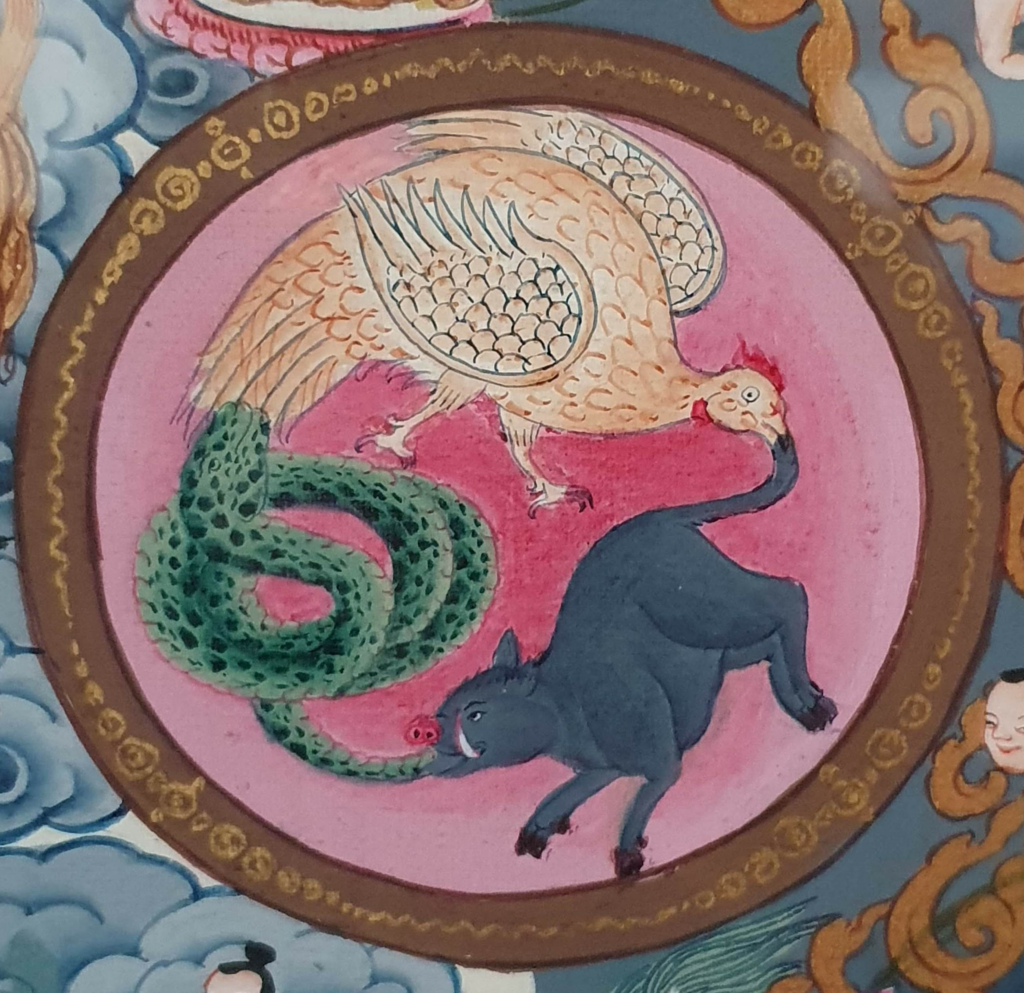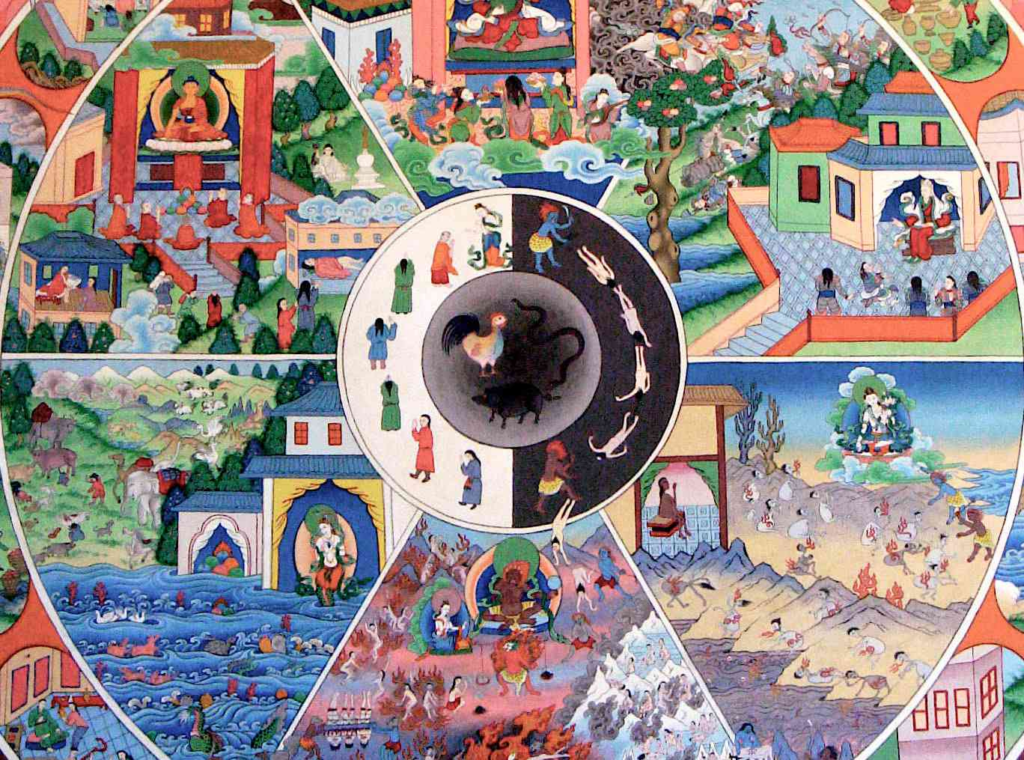Buddhism is a religion that teaches its followers to live in harmony with themselves, others, and the world around them. One of the key concepts in Buddhism is the Three Poisons, also known as the Three Unwholesome Roots. These poisons are considered the root of all suffering and are the main focus of Buddhist teachings.
The Three Poisons are:
- Ignorance – the lack of understanding or awareness of the true nature of reality.
- Attachment – the craving for pleasure and material possessions.
- Aversion – the feeling of dislike or hatred towards someone or something.
These poisons are seen as the source of all mental and emotional suffering.
Understanding the Three Poisons is essential for anyone seeking to follow the Buddhist path. By recognizing and overcoming these poisons, one can achieve a state of inner peace and freedom from suffering.
Understanding the Three Poisons
The three poisons are considered the root of all suffering. To fully understand the Three Poisons and how they arise, one needs to understand a bit about Buddhist philosophy.
Ignorance
Ignorance, or moha in Pali, is the first poison. It is the lack of understanding or knowledge of the true nature of things. Ignorance is the root cause of suffering because it leads to the other two poisons, anger and greed. When one is ignorant, they are unable to see things as they really are and instead create false perceptions that lead to suffering.
Attachment
The second poison is greed/attachment, or lobha in Pali. Greed arises when one is attached to material possessions or desires. Greed can manifest in many forms, such as lust, desire, and delusion. Greed is also a destructive emotion that causes harm to oneself and others.
Aversion
The third poison is anger/aversion, or dosa in Pali. Anger arises when one’s desires are not met or when one is frustrated. Anger can manifest in many forms, such as hatred, aversion, and aggression. Anger is a destructive emotion that causes harm to oneself and others.
In Buddhism, the antidote to the Three Poisons is wisdom. Wisdom is the understanding of the true nature of things. When one has wisdom, they are able to see things as they really are and are not attached to false perceptions or desires. Wisdom is the key to ending suffering and achieving enlightenment.
Symbolism in the Three Poisons

Each poison is symbolized by a specific animal in the Bhavachakra, or Wheel of Life, which is a visual representation of the cycle of birth, death, and rebirth.
Ignorance, represented by a pig, refers to the lack of understanding of the true nature of reality. It is the root of all other afflictions, leading to harmful actions and negative karma. The pig symbolizes the tendency to indulge in sensual pleasures and distractions, which keep one trapped in the cycle of suffering.
Attachment, symbolized by a snake, refers to the clinging to pleasurable experiences and the desire for more. It can manifest as greed, lust, or addiction, leading to a constant craving and dissatisfaction cycle. The snake represents the tendency to coil around objects of desire, suffocate them, and consume them.
Aversion, symbolized by a rooster, refers to the rejection of unpleasant experiences and the desire to avoid them. It can manifest as anger, hatred, or fear, leading to a constant cycle of aversion and aggression. The rooster represents the tendency to attack and peck at anything that threatens one’s sense of security and control.
The Three Poisons are also associated with the chakras, or energy centers, in the body. Ignorance is linked to the root chakra, attachment to the sacral chakra, and aversion to the solar plexus chakra. By recognizing and overcoming these poisons, one can attain enlightenment and liberation from the cycle of suffering.
The Impact of the Three Poisons

The impact of the Three Poisons is far-reaching and affects all aspects of life. They are the root cause of suffering and the source of all negative mental states and emotions leading to destructive behavior, conflicts, and wars.
These behaviors create a cycle of birth, death, and rebirth, otherwise known as samsara.
The Three Poisons are also responsible for the accumulation of karma, the law of cause and effect that governs the cycle of birth, death, and rebirth. Karma is the result of intentional actions and thoughts and determines the quality of one’s future existence. The Three Poisons create negative karma and lead to rebirth in lower realms of existence, where suffering is more intense.
The Three Poisons also affect the ego or self. Desire creates attachment to the self and the desire to accumulate possessions and experiences. Aversion creates the fear of losing the self or the desire to protect it. Ignorance creates the mistaken belief in a permanent self or ego, leading to separation and alienation from others and the world.
Overcoming the Three Poisons
In Buddhism, the three poisons are considered the root of all suffering. These poisons are greed, anger, and ignorance. Overcoming these poisons is essential to achieve enlightenment, liberation, and ultimately, Nirvana.
To overcome these poisons, one needs to cultivate wisdom. Wisdom is the antidote to ignorance, which is the root of all suffering. Through wisdom, one can understand the true nature of reality, which is impermanence and change (see also: our post on the 12 links of dependent origination). By understanding this, one can let go of attachment and craving, which are the causes of greed.
Meditation is an essential tool in overcoming the three poisons. Through meditation, one can develop concentration and mindfulness, which are necessary to cultivate wisdom and overcome the poisons. Meditation also helps one develop loving-kindness, an antidote to anger.
To overcome greed, one needs to cultivate generosity. Generosity helps one to let go of attachment to material possessions and develop a sense of contentment. By being content, one can let go of craving and desire, which are the causes of greed.
To overcome anger, one needs to cultivate patience and compassion. Patience helps one remain calm and composed in the face of adversity, while compassion helps develop empathy and understanding toward others. By understanding others, one can let go of anger and develop loving-kindness.
Frequently Asked Questions
What are the antidotes to the three poisons?
The antidotes to the three poisons are generosity, compassion, and wisdom. Generosity is the antidote to greed, compassion is the antidote to anger, and wisdom is the antidote to ignorance. By cultivating these qualities, one can overcome the three poisons and achieve a state of inner peace and happiness.
What are the three marks of existence?
The three marks of existence are impermanence, suffering, and non-self. Impermanence refers to the fact that everything in the world is constantly changing and nothing lasts forever. Suffering refers to the fact that life is full of pain, disappointment, and dissatisfaction. Non-self refers to the fact that there is no permanent, unchanging self or soul.
Read more about the three marks of existence.
What are the three jewels of Buddhism?
The three jewels of Buddhism are the Buddha, the Dharma, and the Sangha. The Buddha refers to the historical figure of Siddhartha Gautama, who achieved enlightenment and taught the path to liberation from suffering. The Dharma refers to the teachings of the Buddha, which provide a guide for living a meaningful and fulfilling life. The Sangha refers to the community of Buddhist practitioners who support and encourage each other on the path to enlightenment.
